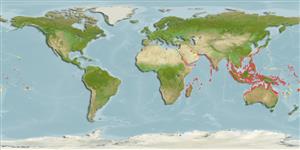Teleostei (teleosts) >
Carangaria/misc (Various families in series Carangaria) >
Sphyraenidae (Barracudas)
Etymology: Sphyraena: Greek, sphyraina, -es = the name of a fish (Ref. 45335).
More on authors: Jordan & Seale.
Environment: milieu / climate zone / depth range / distribution range
Ecology
Marine; reef-associated; depth range 3 - 20 m (Ref. 90102). Tropical; 36°N - 31°S, 30°E - 146°W
Indo-West Pacific: Red Sea and East Africa to New Caledonia and Vanuatu, north to southern Japan. Reported from Fiji and Tuvalu (Ref. 12596).The exact range is uncertain because of confusion of this species with Sphyraena jello and Sphyraena qenie (Ref. 9768).
Size / Weight / Age
Maturity: Lm ? range ? - ? cm
Max length : 90.0 cm TL male/unsexed; (Ref. 2334); common length : 60.0 cm TL male/unsexed; (Ref. 9768)
Dorsal
spines
(total): 6;
Dorsal
soft rays
(total): 9;
Anal
spines: 2;
Anal
soft rays: 7 - 9. Many typical chevron dark markings crossing lateral line on body; caudal fin largely blackish. No gill rakers on first arch, upper and lower gill arch with rough platelets, each platelet not bearing distinct spine.
Found near prominent current-swept lagoons or seaward reefs (Ref. 9710). Also in bays and inner turbid lagoons (Ref. 9768). Nocturnally active, but occurring in relatively large schools during the day (Ref. 9768). Sold fresh or processed into fish cakes (Ref. 27550).
Life cycle and mating behavior
Maturity | Reproduction | Spawning | Eggs | Fecundity | Larvae
Randall, J.E., G.R. Allen and R.C. Steene, 1990. Fishes of the Great Barrier Reef and Coral Sea. University of Hawaii Press, Honolulu, Hawaii. 506 p. (Ref. 2334)
IUCN Red List Status (Ref. 130435)
Threat to humans
Harmless
Human uses
Fisheries: commercial; gamefish: yes
More information
Common namesSynonymsMetabolismPredatorsEcotoxicologyReproductionMaturitySpawningSpawning aggregationFecundityEggsEgg development
ReferencesAquacultureAquaculture profileStrainsGeneticsElectrophoresesHeritabilityDiseasesProcessingNutrientsMass conversion
Tools
Special reports
Download XML
Internet sources
Estimates based on models
Preferred temperature (Ref.
123201): 24.5 - 29.3, mean 28.4 °C (based on 3674 cells).
Phylogenetic diversity index (Ref.
82804): PD
50 = 0.5000 [Uniqueness, from 0.5 = low to 2.0 = high].
Bayesian length-weight: a=0.00759 (0.00466 - 0.01235), b=2.92 (2.78 - 3.06), in cm total length, based on LWR estimates for this species & Genus-body shape (Ref.
93245).
Trophic level (Ref.
69278): 4.5 ±0.0 se; based on diet studies.
Generation time: 2.9 ( na - na) years. Estimated as median ln(3)/K based on 1
growth studies.
Resilience (Ref.
120179): Medium, minimum population doubling time 1.4 - 4.4 years (K=0.3).
Fishing Vulnerability (Ref.
59153): Moderate vulnerability (36 of 100).
Nutrients (Ref.
124155): Calcium = 19.4 [8.7, 53.5] mg/100g; Iron = 0.31 [0.15, 0.69] mg/100g; Protein = 20.5 [18.4, 22.2] %; Omega3 = 0.0794 [, ] g/100g; Selenium = 29.2 [12.5, 81.0] μg/100g; VitaminA = 36.8 [7.9, 194.0] μg/100g; Zinc = 0.436 [0.265, 0.765] mg/100g (wet weight);
